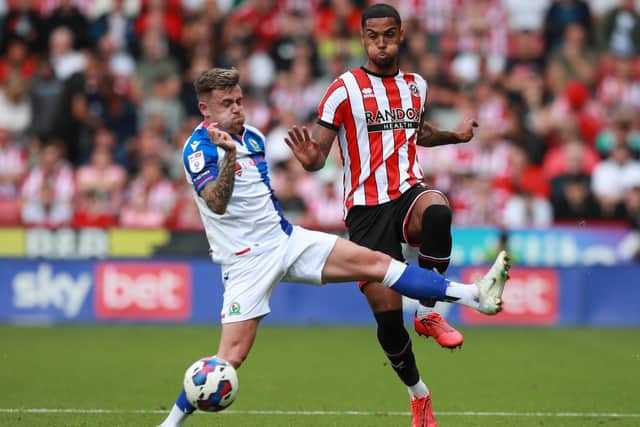Why injuries are niggling Sheffield United manager Paul Heckingbottom and trust is the only solution
"Soon we can talk about football," he says, half-pleading, fully exasperated.
Understandably, Heckingbottom likes to speak about matters he can directly influence, not those outside his remit, but such is the nature of football that chairmen, heads of recruitment and physios rarely hold press conferences, the manager is de facto spokesman for all and sundry.
Advertisement
Hide AdAdvertisement
Hide AdAnd injuries are an unavoidable topic at Bramall Lane. As the manager points out: "We've not had any minor ones, they're real brutal ones.”


Max Lowe is the latest, waiting to hear back from a consultant about the extent of a hamstring problem picked up at Hull City on Sunday and doubly worrying because he had the muscle operated earlier in his career. It matters not just because of the wing-back's form, but because with Enda Stevens and Ben Osborn injured, the only other natural stand-in, Rhys Norrington-Davies, is filling in at left-sided centre-back in the absence of Jack Robinson, Ciaran Clark and Jack O'Connell.
Billy Sharp played a full part in a shortened training session on Thursday but having not featured since Middlesbrough on August 14 –his only start this season and one cut short at half-time – he will need time to build up his fitness. Jayden Bogle, John Fleck and Adam Davies are longer-term absentees.
The excuses are there, but the Blades have not taken them, instead going top of the early Championship.
Advertisement
Hide AdAdvertisement
Hide Ad"The ones that bother me are muscle injuries, because you're wondering why – what have they done beforehand, how will they react if it's a recurring one?" he admits. "To have so many contact injuries at once is frustrating.
"The time people are out for is annoying me. It's not ones where we're having them out for a week or two and just looking after them, we're having some horrific ones where you're seeing a consultant.
"Every time you ask about it, it just winds me up because what can I do? It's a waste of my time and energy.
"If I just focus on that I'm doing a disservice to the players we've got who are trying to win. We can't win with the boys who are not available.
Advertisement
Hide AdAdvertisement
Hide Ad"It's not me being rude or disrespectful, we want them back fit and we'll give them all our time and attention but the focus has got to be on the boys we've got for the next game.
"I'm forgetting about (the injured players) until after the international break. They're nowhere near."
The problem is not just the injuries, but the knock-on effect in a season more condensed than any other thanks to having a six-week World Cup plonked in the middle of it.
"It's a fact we're going to get injuries from the workload," argues Heckingbottom. "You don't get a chance to train, it's play, recover, play, recover. We play in an aggressive fashion – do we want to tell players not to run about and lose? No, we're going to run, we're going to fight and scrap and sometimes injuries are a consequence.
Advertisement
Hide AdAdvertisement
Hide Ad"We've had freaky contact injuries and they've been absolute belters as well. It's not just a bang, a bruise and a dead leg and you miss a game.
"We know we're increasing injuries when we can't change the team. Performance may drop through mental fatigue. It's the only thing I'm wary of.
"(Plus) there's an intensity to how we train. There wasn't much physical contact to Thursday's session – only one ten-minute part of it where there was any sort of contact – but we want a tempo to it.
"But that is a consideration because the more potential contact, with the bodies we're down to, there is a bit more of an injury risk.
Advertisement
Hide AdAdvertisement
Hide Ad"If everyone's firing and champing at the bit in training I'd change things around just to keep the freshness, hunger and drive. We haven't got that luxury at the minute, so we are relying on 15, 16 bodies to get results every week. That's a different challenge for us and for them –holding the fort until the cavalry arrives."We've just got to keep fighting and picking up points but that's what we'll do. It'll be the whole squad who have to help us finish as high as we can. The expectations will still be the same."
It emphasises not only how good the Blades’ start has been but also what a team effort it has had to be.
A squad deep in quality and an extensive off-field staff is packed with people Heckingbottom trusts to do their job whilst he does his.
"I'll get the sack if people are not good at their jobs so there's a responsibility on you to make sure every bit of the club's right but it's impossible to do it all," he says.
Advertisement
Hide AdAdvertisement
Hide Ad"You do need good staff, good people. You've got to have the staff to help you achieve things – playing staff, analysis, S&C (strength and conditioning coaches), medical, coaching, it's a team thing. You have to provide that clarity and set standards. You can't just leave people to it."
The good thing is I'd already worked with these people before and I had the opportunity to bring Macca (assistant Stuart McCall) and Jack (his first-team coach) in, then Tom (Little, head of performance), and make a couple of changes to the analysis department. I know the academy set-up beneath so it was easier in that respect."
So far it is has been a season of trusting in everyone, and so far it is going rather well, despite the manager’s frustration.